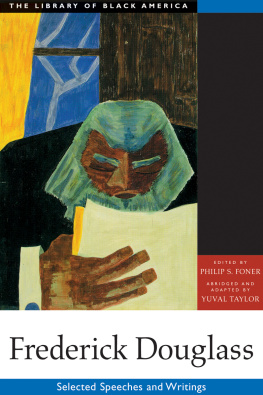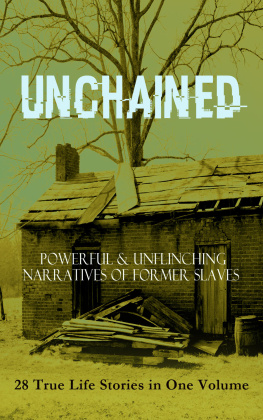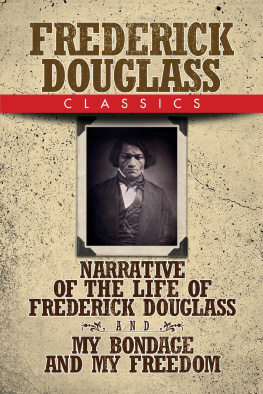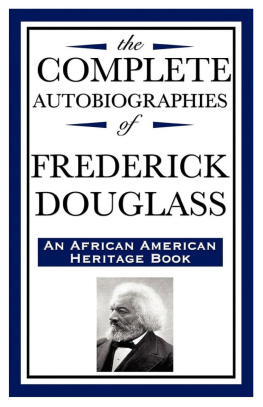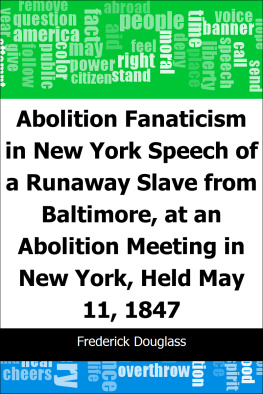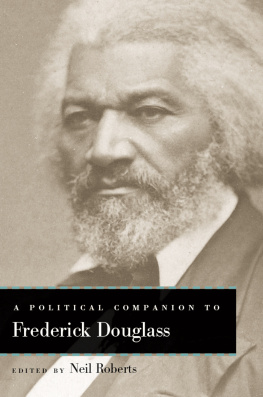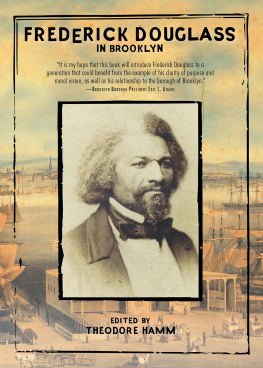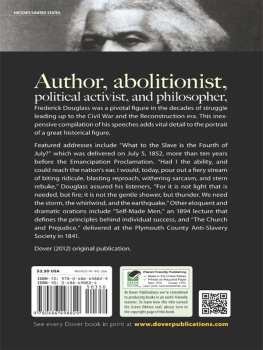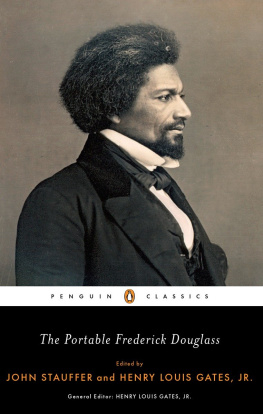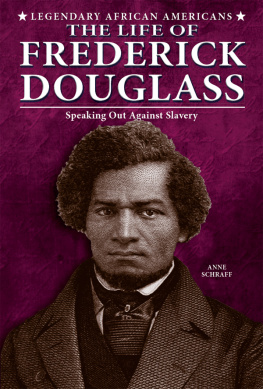
Library of Congress Cataloging-in-Publication Data
Douglass, Frederick, 1817?1895. Selections. 1999.
Frederick Douglass : selected speeches and writings /edited by Philip S. Foner / abridged and adapted by Yuval Taylor.
p. cm.
Includes bibliographical references and index.
ISBN 1-55652-349-1 (cloth).ISBN 1-55652-352-1 (paper)
1. Antislavery movementsUnited StatesHistory19th century. 2. SlavesUnited StatesSocial conditions19th century. 3. Afro-AmericansCivil rightsHistory19th century. 4. Speeches, addresses, etc., American. I. Foner, Philip Sheldon, 1910-1994.
II. Taylor, Yuval. III. Title.
E449.D7345 1999
973.8092dc21
99-23180
CIP
This book is an abridgement and adaptation of Philip S. Foners The Life and Writings of Frederick Douglass, originally published in New York in five volumes, 1950-1975. It is published by arrangement with Elizabeth Foner Vandepaer and Laura Foner.
Copyright 1950, 1952, 1955, 1975, International Publishers
This edition copyright 1999 Estate of Philip S. Foner and Yuval Taylor
All rights reserved
First edition
Published by Lawrence Hill Books
An imprint of Chicago Review Press, Incorporated
814 North Franklin Street
Chicago, Illinois 60610
ISBN 1-55652-349-1 (cloth)
1-55652-352-1 (paper)
Printed in the United States of America
5 4 3 2 1
CONTENTS
INTRODUCTION
I n a fifty-four-year career as the preeminent spokesman for African Americans, Frederick Douglass gave over 2,000 speeches; wrote thousands of editorials, articles, and letters; and, not incidentally, published three autobiographies, the first two of which are now commonly acknowledged as masterpieces transcending their genre. Although most students of African American history and literature study the latter, during his life Douglass was mainly known as an orator, not an autobiographer; and it was through his speeches and writings that Douglass changed American history. For, more than any other African American, it was he who was responsible for the downfall of slavery, for the enlistment of men of his race in the Union army, and, in the last few years of his life, for the awakening of the American people to the realization that, through disenfranchisement, slavery-like practices, and wholesale slaughter, Southern blacks had lost almost every gain they had made during the Civil War and Reconstruction.
The power of oratory in the formation of public opinion in nineteenth-century America was as great as that of television today, for political culture had inherited from the Revolutionary period a classical, oratorical, consensus-based model. With his combination of rhetorical power, intellectual acumen, classical eloquence, and physical presence, Douglass may well rank as the greatest American orator of his time. The testimony of his contemporaries helps explain why. Only four months after his first speech at a Nantucket anti-slavery meeting in 1841, N. P. Rogers, a New Hampshire editor, wrote:
As a speaker he has few equals. It is not declamationbut oratory, power of debate. He watches the tide of discussion with the eye of the veteran, and dashes into it at once with all the tact of the forum or the bar. He has wit, argument, sarcasm, pathosall that first-rate men show in their master efforts. His voice is highly melodious and rich, and his enunciation quite elegant, and yet he has been but two or three years out of the house of bondage. The brotherhood of thieves, the posse comitatus of divines, we wish a hecatomb or two of the proudest and flintiest of them, were obliged to hear him thunder for human liberty, and lay the enslavement of his people at their doors. They would tremble like Belshazzar.
And in 1852, William G. Allen, a professor of rhetoric and belles lettres, wrote:
In versatility of oratorical power, I know of no one who can begin to approach the celebrated Frederick Douglass. He, in very deed, sways a magic wand. In the ability to imitate, he stands almost alone and unapproachable; and there is no actor living, whether he be tragedian or comedian, who would not give the world for such a face as his. His slaveholders sermon is a masterpiece in its line [see the first speech in this collection, The Church and Prejudice]. When he rises to speak there is a slight hesitancy in his manner, which disappears as he warms up to the subject. He works with the power of a mighty intellect, and in the vast audiences which he never fails to assemble, touches chords in the inner chambers thereof which vibrate music now sweet, now sad, now lightsome, now solemn, now startling, now grand, now majestic, now sublime. He has a voice of terrific power, of great compass, and under most admirable control. Douglass is not only great in oratory, tongue-wise, but, considering his circumstances in early life, still more marvelous in composition, pen-wise. Long may he livean honor to his age, his race, his country and the world.
Douglass clearly drew from African American rhetorical traditionsstorytelling, trickster tales, black preaching, and signifying. But his speeches and writings for the most part confirm, rather than challenge, the American rhetorical practice of his time. For example, his apocalyptic visions of Americas future were usually counterbalanced by an offer of hope that the true American values embodied in the Declaration of Independence could be sustained. Douglass mixture of doomsaying with affirmation of Americas potential for greatness fits well into a long tradition of American jeremiads stretching from the seventeenth century to the present day. Also typical were his rhetorical crescendoes from a plain style at the beginning of a speech to a grand style at the end; his skillful deployment of a host of rhetorical devices such as anaphora, personification, wordplay, antithesis, and hyperbole; his citations from the Bible, Shakespeare, and eighteenth- and nineteenth-century writers; his extended use of irony and sarcasm when denouncing wrongdoing; and, as the century progressed, his increasing reliance on documentation to verify his points.
However fully Douglass fit into the American rhetorical tradition, though, his raceat least at firsteffectively excluded him from it. At the time of his entry into the field of oratory, African Americans were almost universally regarded as culturally inferior, and a black orator would far sooner be judged an oddity than a leader. What enabled Douglass to overcome this handicap and break down these prejudicesand what helped distinguish him from contemporaneous orators such as Wendell Phillips, Edward Everett, and Ralph Waldo Emersonwas not only his remarkable rhetorical skill, but his inventiveness, militancy, breadth of knowledge, sense of humor, skill at mimicry, vivid language, and emotional investment in every word he spoke. Considering that the vast majority of his arguments concern only one broad topicthe conditions and rights of African Americansthe variety of his approaches and ideas is all the more astonishing. But Douglass did not like to repeat himself. He makes this clear in his account of his growth as an orator in his second autobiography, My Bondage and My Freedom:
During the first three or four months, my speeches were almost exclusively made up of narrations of my own personal experience as a slave. Let us have the facts, said the people. So also said Friend George Foster, who always wished to pin me down to my simple narrative. Give us the facts, said Collins, we will take care of the philosophy. Just here arose some embarrassment. It was impossible for me to repeat the same old story month after month, and to keep up my interest in it. It was new to the people, it is true, but it was an old story to me; and to go through with it night after night, was a task altogether too mechanical for my nature. Tell your story, Frederick, would whisper my then revered friend, William Lloyd Garrison, as I stepped upon the platform. I could not always obey, for I was now reading and thinking. New views of the subject were presented to my mind. It did not entirely satisfy me to
Next page
